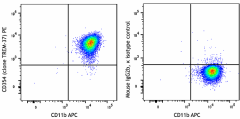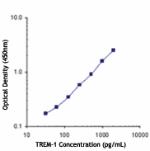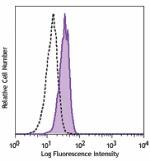- Clone
- TREM-37 (See other available formats)
- Regulatory Status
- RUO
- Other Names
- Triggering receptor expressed on myeloid cells 1, triggering receptor expressed on monocytes 1
- Isotype
- Mouse IgG2b, κ
- Ave. Rating
- Submit a Review

| Cat # | Size | Price | Quantity Check Availability | Save | ||
|---|---|---|---|---|---|---|
| 316103 | 25 tests | 108€ | ||||
| 316104 | 100 tests | 244€ | ||||
TREM-1 is a 30 kD glycoprotein also known as triggering receptor expressed on myeloid cells 1, and triggering receptor expressed on monocytes 1. It is a Type I membrane protein that contains an immunoglobulin-like V-type domain. Alternatively spliced protein variant may be secreted. TREM-1 is highly expressed on peripheral blood myeloid cells (particularly mature monocytes and granulocytes); TREM-1 expression can be further upregulated by bacteria, fungi and lipopolysaccharide. TREM-1 has been shown to interact with the adaptor protein DAP12 to stimulate neutrophil and monocyte-mediated inflammatory responses through the triggering and release of pro-inflammatory cytokines and chemokines. TREM-1 is thought to amplify inflammatory responses to fungal and bacterial infections and potentiate septic shock. This antibody has been shown to be useful for Western blotting, flow cytometric staining, and ELISA pairing with biotinylated TREM-26 antibody (Cat. No. 314904) as a detection antibody.
Product DetailsProduct Details
- Verified Reactivity
- Human
- Antibody Type
- Monoclonal
- Host Species
- Mouse
- Immunogen
- Recombinant human TREM-1
- Formulation
- Phosphate-buffered solution, pH 7.2, containing 0.09% sodium azide and BSA (origin USA)
- Preparation
- The antibody was purified by affinity chromatography and conjugated with PE under optimal conditions.
- Concentration
- Lot-specific (to obtain lot-specific concentration and expiration, please enter the lot number in our Certificate of Analysis online tool.)
- Storage & Handling
- The antibody solution should be stored undiluted between 2°C and 8°C, and protected from prolonged exposure to light. Do not freeze.
- Application
-
FC - Quality tested
- Recommended Usage
-
Each lot of this antibody is quality control tested by immunofluorescent staining with flow cytometric analysis. For flow cytometric staining, the suggested use of this reagent is 5 µL per million cells in 100 µL staining volume or 5 µL per 100 µL of whole blood. It is recommended that the reagent be titrated for optimal performance for each application.
- Excitation Laser
-
Blue Laser (488 nm)
Green Laser (532 nm)/Yellow-Green Laser (561 nm)
- Application Notes
-
ELISA Capture: The purified TREM-37 antibody is useful as a capture antibody for TREM-1 specific sandwich ELISA, when used in conjunction with the biotinylated TREM-26 antibody (Cat. No. 314904) as a detection antibody.
- RRID
-
AB_2941488 (BioLegend Cat. No. 316103)
AB_2941488 (BioLegend Cat. No. 316104)
Antigen Details
- Structure
- Type I membrane protein, 30 kD, contains immunoglobulin-like V-type domain. Alternatively spliced variant may be secreted.
- Distribution
-
Expressed in adult liver, lung, and spleen, lower expression in lymph node, placenta, spinal cord, and heart. Expression on peripheral blood monocytes and granulocytes.
- Function
- Stimulates neutrophil and monocyte-mediated inflammatory responses through the triggering and release of pro-inflammatory cytokines and chemokines and the upregulation of surface activation markers. Amplifies inflammatory responses to fungal and bacterial
- Interaction
- DAP12
- Modification
- Glycosylated
- Cell Type
- Granulocytes, Monocytes
- Biology Area
- Cell Biology, Immunology, Innate Immunity, Neuroinflammation, Neuroscience
- Molecular Family
- CD Molecules, Cytokines/Chemokines
- Antigen References
-
1. Bouchon A, et al. 2001. Nature 410:1103.
2. Bouchon A, et al. 2000. J. Immunol. 164:4991.
3. Gingras MC, et al. 2002. Mol. Immunol. 38:817. - Regulation
- Upregulated by bacteria, fungi, and LPS
- Gene ID
- 54210 View all products for this Gene ID
- UniProt
- View information about CD354 on UniProt.org
Related FAQs
- What type of PE do you use in your conjugates?
- We use R-PE in our conjugates.
Other Formats
View All CD354 Reagents Request Custom Conjugation| Description | Clone | Applications |
|---|---|---|
| Purified anti-human CD354 (TREM-1) | TREM-37 | FC,ELISA Capture,WB |
| PE anti-human CD354 (TREM-1) | TREM-37 | FC |
Compare Data Across All Formats
This data display is provided for general comparisons between formats.
Your actual data may vary due to variations in samples, target cells, instruments and their settings, staining conditions, and other factors.
If you need assistance with selecting the best format contact our expert technical support team.
-
Purified anti-human CD354 (TREM-1)


Human peripheral blood granulocytes were stained with purifi... -
PE anti-human CD354 (TREM-1)

Human peripheral blood granulocytes were stained with anti-h...

 Login / Register
Login / Register 

















Follow Us